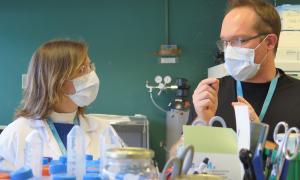Both antibodies generated by vaccination and by natural infection block the SARS-CoV-2 variant described in England

A study led by IrsiCaixa shows that people who have been infected with SARS-CoV-2 and those who have received two doses of the Pfizer/BioNTech vaccine generate antibodies capable of blocking both the original virus and the variant described in England
The ability of antibodies to protect us from the new variants of SARS-CoV-2 is an unsolved question that must be answered in order to predict the evolution of the pandemic. The IrsiCaixa AIDS Research Institute, a centre jointly promoted by the "la Caixa" Foundation and the Department of Health of the Generalitat de Catalunya, has shown that people who have been infected and those who have received two doses of the Pfizer/BioNTech vaccine have antibodies capable of blocking the SARS-CoV-2 variant described in England. The results of the study also suggest that the antibody response is refined over time as people who were infected during the first wave of infection, and therefore infected with the original variant of the virus, are better able to block the variant described in England six months after infection than at baseline. IrsiCaixa is currently studying the efficacy of antibodies against the different variants that exist to date in order to understand the evolution of immunity against SARS-CoV-2.
When SARS-CoV-2 genome is replicated inside the infected cells, the molecular machinery makes mistakes and introduces random mutations resulting in new variants. Mutations can be in different areas of the genome and thus affect multiple parts of the virus, including the spike protein, which is located on the virus membrane and is the main target of neutralizing antibodies. When this protein is modified, antibodies may not be able to bind to it as efficiently, therefore hampering the capacity of the immune system to control or prevent the infection. "At this point in the pandemic, we need to understand whether the antibodies we have can protect us against the new variants and how long this protection lasts", explains Julià Blanco, principal investigator at IrsiCaixa and the Germans Trias i Pujol Research Institute.
Protection against the UK variant
During the study, the protective ability of antibodies was evaluated in 53 people who had been infected and 32 people who had received two doses of the Pfizer/BioNTech vaccine. The samples came from the Germans Trias i Pujol Hospital and the Sant Joan de Déu de Manresa Hospital of the Althaia Foundation. To assess protection, IrsiCaixa researchers worked with pseudoviruses, that is, non-replicative viruses, which express the SARS-CoV-2 spike protein. In some of these pseudoviruses, researchers have kept the spike protein of the original virus and in other pseudoviruses researchers have incorporated mutations of interest. In the latter, the introduced mutations are those of the SARS-CoV-2 variant first detected in England (B.1.1.7).
The results show that infected people block very well and in a very similar way both the original variant and the one described in England. In fact, they found that people who had been infected during the first wave and had generated antibodies against the original variant had a better response against the British variant six months after infection than at baseline. These results suggest that the body's own antibodies against the original virus are refined over time and improve their ability to block the new variants. "The natural infection, compared to vaccination, generates a better quality immune response against SARS-CoV-2 since it exposes different proteins of the virus to the immune system over time" says Benjamin Trinité, postdoctoral researcher at IrsiCaixa. "Moreover, some parts of the virus may remain inside the body and help refine the antibody response overtime", he adds.
For people who have received two doses of the vaccine and have not previously been infected, their antibodies are twice less effective at blocking the British variant compared to the original virus. However, in all cases the antibody levels are high enough to prevent infection with both variants. On the other hand, people who had already been infected and then received the vaccine have antibodies that neutralise both variants very efficiently and even work better against the British variant. "The results show that most people have protection against both variants, but we don't know how long this protection will last, and there may be people who lose their antibodies", says Edwards Pradenas, predoctoral researcher at IrsiCaixa. "That is why we must continue to wear masks, maintain social distancing and follow all the prevention measures until there is a very low incidence of new infections and a very high percentage of vaccinated population", he adds.
Monitoring of SARS-CoV-2 immunity
Previous IrsiCaixa studies show that antibodies against SARS-CoV-2 are maintained for at least six months after infection. However, not enough time has yet passed to determine how long the protection generated by the vaccine actually lasts. "It is important to track people who have been infected and those who have been vaccinated to find out how long their immunity lasts and also whether it protects them from new variants as they emerge. This is a very large volume of work in the laboratory, but we believe it is essential and we are devoting a lot of effort to it", says Bonaventura Clotet, director of IrsiCaixa. In this sense, IrsiCaixa is already working with the variants described in South Africa and Brazil, and will soon have results on the immunity generated against these variants both in people who have already been infected and in those who have been vaccinated. "The aim is to do the same with all relevant variants that emerge. Monitoring the most predominant mutations will allow us to realistically adapt vaccination campaigns and better predict the evolution of the pandemic", Blanco concludes.